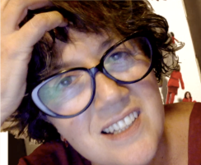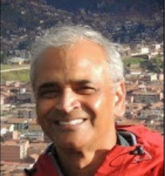Translated from the Spanish by Dipen Bhattacharya
1. Phantom pain
The idea of a pandemic reminds us of an atavistic power: a single body, ours, is all bodies. The situation of millions performing the same act of locking themselves in simultaneously makes us a single, same animal reacting —yes, by obligation or mandate— mainly by instinct and performing the most serious of modern sins: unproductivity. And not “generating” wealth, as the system wants, brings us together in another way of producing value: the value of valuing life. And, that’s it. The simple and easy, the elementary “life.” Surviving out of solidarity, out of selfishness, with awareness of the other or not, makes us realize many things. Nothing more than that. On the other hand, I think about the encounter with our physical dimension. Personally, my body, now confined, lives on its own in its deep mechanism being, as I imagine it did as a baby: in a limited space, I am, as never before, in it, for it, with it. Actuating it, thinking it, feeling it. Day by day, I discover all its possibilities. And yes, some are revealed now, new.
I have also felt my body over time; I have meditated on its routines. My mind elaborates thoughts that stir the past with the possibility of a future, but that inretieveably run into this continuous present that seems to erase the days and merge the hours with the years, the months with the minutes. I feel that I live these days as a phantom pain, the absence of something that insists on manifesting itself. The days amputated, the time that I no longer have, that “I did not live” and that I will not be able to live, really, with all my gestures: those practices and habits that distinguished my daily life, mental and corporal, are now arms and legs removed. I will recover my limbs, obviously, although I really wonder what form they will have, what stimuli they will respond to and, above all, who will be the person / organism that activates them: what will I recover, who will I be after this?
2. The useful and the useless (from created needs to necessary creations)
Teodoro Adorno said, when speaking of social movement, that when it is fulfilled and in the face of failure of its expectations, the social group experiences the unexpected as “not knowing what to do.” Today, we know very well what we should do, we have long lived in an overdiagnosed world. But we don’t know how to implement the cure or we don’t want to enforce it, obviously. Capitalism has various ways of avoiding treatment. One of them, the idea of apocalypse, is a way of instilling terror and snatching away our agency. The system wants to convince us that after it, there is nothing. Today, necro-capitalism, the current mode of capitalism, can only achieve its objectives by marginalizing, excluding, exterminating human beings, nature and communities. What will necro-capitalism die of? Often we have been extinguished. Now, after the pandemic, I wonder if as individuals we will recover our agency and launch ourselves, now finally, to make a world for ourselves, habitable, in order to stop being just a useful instrument for the huge factory of useless gadgets and feelings. Will we move from created needs to needed creations?
3. Have something in common
There is something fascinating about the idea of a pandemic. It’s like finally having something in common. I think about this because I have always been confused in my relationship with the idea of “civilization”: I cannot decide between affirming that “I hate people but I love humanity” or declaring that “I love people but I hate humanity.” You know, on the one hand, I think of my loved ones as opposed to those atrocities like war and genocides. And on the other hand, I remember that politician who got rich buying cancer treatments that instead of (expensive) medicine contained (cheap) water and were administered to hundreds of girls and boys, but I also think about the opposite, about those thousands of people who work tirelessly for human rights, the environment or the victims of heinous crimes. Anyway. I recently decided that the two opinios represent me.
While I meditate on our miseries and kindness, I resolve: we know that the pandemic has brought us closer, has built a bridge of communication or better, of emotion, among millions of human beings. We are all sick, if not from Covid-19, then from fear, uncertainty, rage, fed up and from imaginary monsters and real vampires. But we could also say that we are healthy from solidarity, empathy, participation and mutual support. This must be pointed out, above all, because the world will have to reconfigure itself, it has been said ad nauseam, around this class of human traits as a repudiation of the values of capitalism. Is productivity fought with unproductive acts? I don’t know, but at least, let’s bet on exasperating it until it gives up in despair.
I have always believed that the highest faculties of what we call Person are instinct, emotion, and intuition. The stone must be extracted, but of sanity. Because really, it seems incredible to me that at this point in the 21st century, there are still people who doubt that there is an irrational explanation for everything.
4. A kite
I have already spent many days in the same place, moving fast between news, books, tweets and radio broadcasts. I have had dreams such as dreams, ideas and thoughts, white moments such as the sheet of ghosts, melancholy, nostalgia and euphoria. A whole human being has passed over me, humanity has passed through me. Sometimes I feel like I’m on the roof of the world, flying the kite of what we are. I have seen it becoming entangled in the branches of a tree and be struck by lightning and by hail. Flying with the air of the times that blows and rocks it, and lifts it, and then rocks it again.
Originally published in Spanish in Traducciones para Bitácora del Encierro – https://bitacoraencierro.org/



























0 Comments